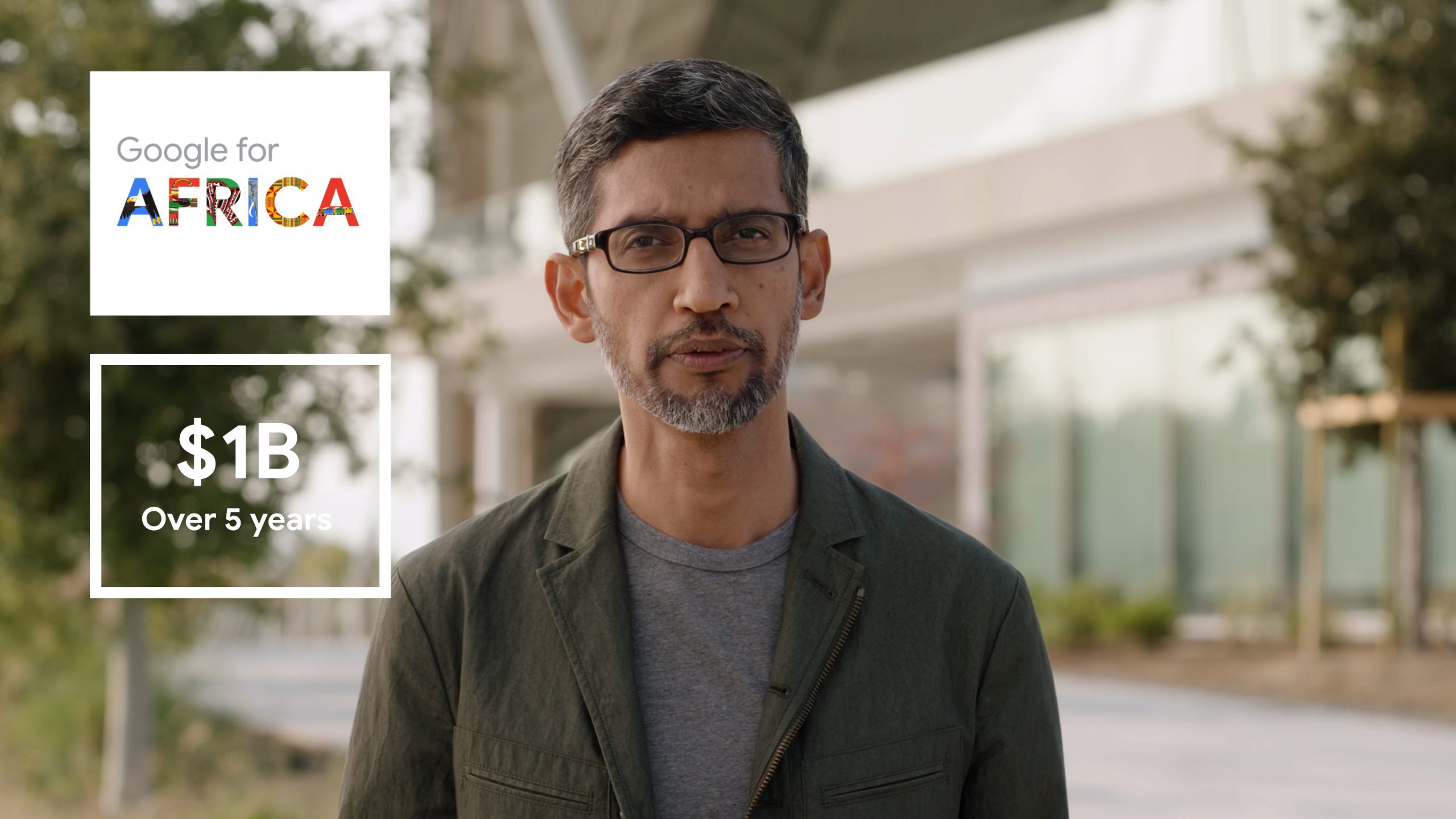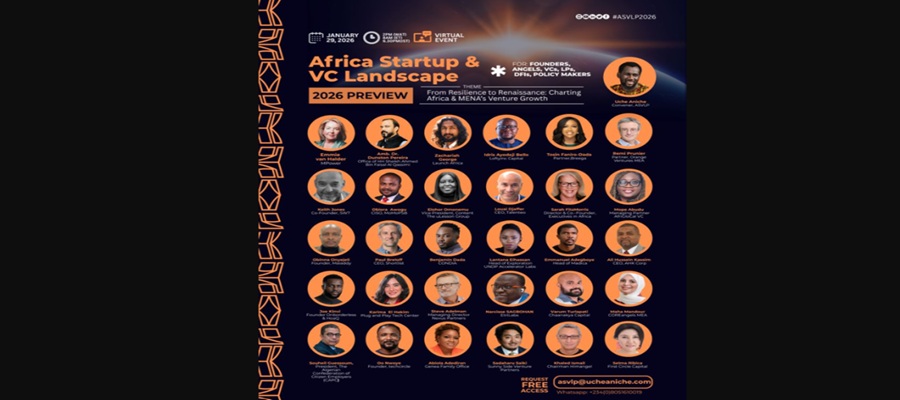Telecom
Google to Invest $1Bn to Support Digital Transformation in Africa

Google has announced plan to invest $1billion over 5 years to support Africa’s digital transformation.

Sundar Pichai, CEO of Google and Alphabet
The investment focuses on enabling fast, affordable internet access for more Africans; building helpful products; supporting entrepreneurship and small business; and helping nonprofits to improve lives across Africa.
The announcement was made at Google’s first ever Google for Africa event, held virtually and livestreamed.

Juliet Ehimuan. Google country manager, Nigeria speaking on Google’s investment in Sub-Saharan Africa
The planned $1billion investment announced today by Sundar Pichai, CEO of Google and Alphabet, will include:
- Enabling affordable internet access and building helpful products
- Google is building global infrastructure to help bring faster internet to more people and lower connectivity costs. The subsea cable Equiano will run through South Africa, Namibia, Nigeria and St Helena and connect the continent with Europe.
- Internet access is also hampered by the affordability of smartphones. Android has developed a device locking technology as part of the Android platform that will enable partners to offer financed devices. Google has collaborated with Kenya’s largest carrier Safaricom to support the launch of the first “Device Financing” plan in Kenya, and will expand this initiative across Africa with partners like Airtel,MTN, Orange, Transsion Holdings and Vodacom, and more. These partnerships will help millions of first-time smartphone users gain access to quality, affordable Android smartphones.
- Plus Codes are a free and open source addressing system to provide addresses for everyone. The government of The Gambia has adopted this in providing addresses for residents and businesses across the capital Banjul and are now scaling to the rest of the country. Plus codes will expand to South Africa, Kenya and other countries in partnership with governments and non-governmental organisations.
- Investments in entrepreneurship and technology. Through a Black Founders Fund, Google will invest in Black-led startups in Africa by providing cash awards and hands-on support. This is in addition to Google’s existing support through the Google for Startups Accelerator Africa, which has helped more than 80 African startups with equity-free finance, working space and access to expert advisors over the last three years. Google also announced the launch of an Africa Investment Fund. Through this fund, the company will invest $50M in startups and provide them with access to Google’s employees, network, and technologies to help them build meaningful products for their communities.

Ruth Porat, chief financial officer of Alphabet Inc. and Google Inc
- Empowering businesses as they continue or embark on their digital transformation: In collaboration with the non-profit organisation Kiva, Google is providing $10M in low-interest loans to help small businesses and entrepreneurs in Ghana, Kenya, Nigeria and South Africa get through the economic hardship created by COVID-19.
- Renewed funding for nonprofits.org is expanding its commitment to support nonprofits working to improve lives across Africa, with $40M to help more partners who are responding to challenges they see first hand in their communities – innovators like the Airqo team at Makerere University, who use AI and sensors to monitor poor air quality, a leading cause of premature death. Google is providing $3M in new grant funding to expand this pioneering work from Kampala across 10 cities in 5 countries on the continent.
The announcement expands Google’s ongoing support for Africa’s digital transformation and entrepreneurship. In 2017, Google launched its Grow with Google initiative with a commitment to train 10 million young Africans and small businesses in digital skills. To date, Google has trained over 6 million people across 25 African countries, with over 60% of participants experiencing growth in their career and/or business as a result.

Mariam Abdullahi. Director | Android Platform Partnerships | Africa at Google
Google has also supported more than 50 nonprofits across Africa with over $16million of investment, and enabled hundreds of millions of Africans to access internet services for the first time through Android.
Sundar Pichai, CEO of Google and Alphabet, said: “We’ve made huge strides together over the past decade — but there’s more work to do to make the internet accessible, affordable and useful for every African.
“Today I’m excited to reaffirm our commitment to the continent through an investment of $1B over five years to support Africa’s digital transformation to cover a range of initiatives from improved connectivity to investment in startups.”
Nitin Gajria, Managing Director for Google in Africa added: “I am so inspired by the innovative African tech startup scene. In the last year we have seen more investment rounds into tech startups than ever before.
“I am of the firm belief that no one is better placed to solve Africa’s biggest problems than Africa’s young developers and startup founders. We look forward to deepening our partnership with, and support for, Africa’s innovators and entrepreneurs.”
Hon. Minister Stella Tembisa Ndabeni-Abrahams, Minister of Small Business Development, South Africa said: “I am happy to note that Google has been active in supporting Small to Medium Enterprises, dedicating even more resources to this sector, since the start of the Covid-19 pandemic. In the last 12 months, Google has helped close to 500,000 African businesses get online and reach new customers.”

Nitin Equiano
Providing a platform for African cultural treasures and collections
Since 2012, the Google Arts & Culture team has partnered with institutions across the continent to preserve and promote their collections, providing a free online platform which anyone around the world can access.
The result is hundreds of expertly-curated stories about Africa by Africans. This includes a new project called ‘Cradle of Creativity’ dedicated to the creative history and heritage of Africa.
In collaboration with the Yemisi Shyllon Museum of Art in Nigeria and the Origins Centre in South Africa, people across the globe can explore more than five hundred high resolution images, sixty expertly-curated stories with audio narrations, as well as Street View virtual tours, helping to showcase Africa’s creative talent and heritage.
Telecom
ASVLP 2026: Africa, MENA VCs Gear Up as Tech Funding Hits $4.1bn Rebound

As Africa and MENA’s startup ecosystems transition from post-correction resilience into a new phase of disciplined growth, the Africa Startup & VC Landscape Preview (ASVLP 2026) will convene leading founders, investors, policymakers, and ecosystem builders on January 29, 2026, for its second annual, agenda-setting virtual forum.

Following a challenging global venture cycle, 2025 marked a notable rebound across the African ecosystem, with startups raising an estimated $3.2–$3.3 billion over the full year.
The recovery was accompanied by significant structural shifts: Kenya emerged as the leading destination among Africa’s “Big Four” markets for the first time, while Nigeria recorded a year-on-year funding decline, reflecting changing investor preferences, macroeconomic pressures, and a broader recalibration toward capital efficiency and sustainability.
Sectorally, fintech remained the most funded vertical, while climate & energy, AI-enabled solutions, healthtech, and infrastructure-adjacent businesses gained increasing attention. Across Africa and MENA, development finance institutions (DFIs) and family offices played a more pronounced role in anchoring funds, deploying catalytic capital, and supporting blended-finance structures, reshaping how early-stage and growth capital is mobilized.
ASVLP 2026 is designed to translate these data points into forward-looking strategy.
The forum will bring together venture capitalists, angel investors, LPs, DFIs, family offices, founders, corporate leaders, and regulators from Africa, MENA, Europe, and North America to assess 2025 outcomes and chart priorities for 2026.
The program will feature keynotes, fireside chats, panels, and deep-dive roundtables, including discussions on:
· The 2026 Africa & MENA FinTech Landscape, focusing on security, profitability, regulation, and growth frontiers
· Emerging Fund Managers, capital formation, and LP alignment
· Talent, operator depth, and institutional capacity as constraints to scale
· Regulatory evolution and cross-border market integration
A major highlight of ASVLP 2026 will be the Final DealRoom Pitch Session, where a curated group of high-potential startups will present to an experienced panel of investors.
• Founders can apply to pitch via: bit.ly/ASVLP-DR-Founders
• Investors seeking DealRoom access can request entry via: bit.ly/ASVLP-DR-Investors
Confirmed speakers for ASVLP 2026 include Khaled Ismail (HIMangel), Idris Ayodeji Bello (LoftyInc Capital), Zachariah George (Launch Africa), Tosin Faniro-Dada (Breega), Selma Ribica (FirstCircle Capital), Maha Mandour (COREangels MEA), Joe Kinvi (Borderless), Remi Prunier (Orange Ventures MEA), Karima El Hakim (Plug and Play Tech Center), Souheil Guessoum (President, The Confederation of Citizen Employers – Algeria (CAPC)), Remi Prunier (Partner, Orange Ventures, MEA), Maha Mandour (COREAngels MEA), Ali Hussein (President, Kenyan FinTech Association), Patrick Okebu (CIO, Interswitch Group) among other leading voices shaping capital, policy, and innovation across the region.
“The conversation has shifted,” said Uche Aniche, Convener of ASVLP. “It’s no longer about whether capital will return to Africa and MENA, but what kind of capital, deployed with what discipline, and in service of which long-term outcomes. ASVLP exists to help the ecosystem make sense of that transition.”
Participation in ASVLP 2026 is free but strictly by invitation.
Interested participants are encouraged to repost the official announcement on LinkedIn and comment #ASVLP2026 to receive a private registration link. They could also email [email protected] and request invite.
Telecom
TikTok, Instagram Blamed in US Youth Suicide Lawsuit

Major social media giants Meta Platforms, TikTok and Alphabet’s YouTube will face a landmark jury trial this week in Los Angeles County Superior Court over allegations that their addictive designs have fuelled a youth mental health crisis, marking the first such case to reach this stage.

Social Media
The pivotal personal injury lawsuit centres on a 19-year-old Californian woman identified as K.G.M., who claims her childhood immersion in Instagram, Facebook, YouTube and TikTok—engineered with endless scrolls, autoplay videos, notifications and algorithms—sparked severe anxiety, depression and suicidal thoughts.
Dozens of similar suits have surged since 2022 from families, schools and states, accusing the firms of burying internal research on teen harms while prioritising ad revenue through youth-targeted engagement hooks, despite Section 230 protections for user content.
Plaintiffs seek damages and design overhauls, arguing platforms bypassed parents and preyed on vulnerable kids; defendants counter there’s no clinical “social media addiction” diagnosis, no proven causation—kids with issues often use less—and they’ve added safeguards like parental controls and time limits.
Echoing Australia’s under-16 bans, the trial will scrutinise thousands of internal documents, expert testimonies and K.G.M.’s story, potentially expanding tech liability amid debates where studies show complex links, not direct causation, between screen time and disorders like eating issues or self-harm.
A win could mandate warning labels, age gates or algorithm tweaks, reshaping global platforms as U.S. Surgeon General advisories and global scrutiny intensify pressure on Big Tech to prioritise child safety over profits.
Telecom
Meta Tests Paid Subscriptions Across Instagram, Facebook, WhatsApp

Meta is gearing up to trial paid subscription services on Instagram, Facebook, and WhatsApp, aiming to diversify revenue streams beyond advertising while maintaining free core access for all users.

Meta
The subscriptions will offer enhanced tools tailored for everyday users, creators, and businesses, including advanced content creation, sharing, and workflow features distinct from the existing Meta Verified verification program. Unlike a uniform rollout, Meta plans varied testing formats per app to match diverse audiences, experimenting with feature bundles based on user feedback to refine the model.
A key element involves integrating Manus, the autonomous agent firm Meta acquired for $2 billion in December, into these apps alongside its enterprise sales. Manus enables complex task automation with minimal input, with early signs like Instagram shortcuts already spotted by reverse engineer Alessandro Paluzzi.
Video tools feature prominently: Meta’s Vibes short-form video generator in the Meta AI app shifts to freemium, where paid tiers unlock higher monthly creation limits beyond the free baseline. On Instagram, subscriptions could enable unlimited audience lists, non-follower tracking, and anonymous Story views, though specifics for Facebook and WhatsApp remain under wraps.
Drawing from Meta Verified’s 2023 launch—which provides badges, support, and protection mainly for creators—these broader plans target wider appeal amid industry shifts. Ad growth slows against TikTok competition, while Snapchat+ boasts 16 million subscribers at $3.99 monthly, proving demand for value-driven paid perks despite subscription fatigue risks from streaming and storage fees.
Meta will phase tests gradually, prioritizing feedback to shape long-term viability without alienating free users.

 News3 days ago
News3 days agoLIRS to Invoke NTAA to Recover Unpaid Taxes from Bank Accounts, Others

 News3 days ago
News3 days agoAnambra Cuts Monday Pay to Kill Sit-at-Home

 E-Financial3 days ago
E-Financial3 days agoFirst Asset Management Receives Upgraded Ratings from Agusto &Co and DataPro

 E-Financial3 days ago
E-Financial3 days agoNIBSS, Others Flag 13,417 Nigerian Fraudsters on Person of Interest Portal

 E-Financial3 days ago
E-Financial3 days agoCBN Prepares Fresh Debit Card Rules to Improve ATM Services

 General News3 days ago
General News3 days agoNigeria Treats Religious Violence as Attack on State – NSA Ribadu

 E-Financial2 days ago
E-Financial2 days agoCBN Upgrades Licences of Opay, Moniepoint, Kuda, Palmpay, Paga to National Status

 News2 days ago
News2 days agoTech Executives Double Down on AI, Talent and Adaptive Strategies to Lead in the Intelligence Age

























